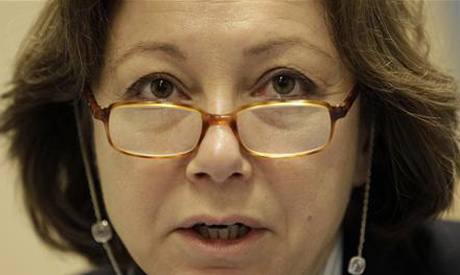
Bassma Kodmani, ex-spokeswoman for the Syrian National Council (SNC) . (Photo: Reuters)
The former spokesperson of the Syrian National Council (SNC), Basma Kodmani, has alleged that President Bashar Al-Assad released Al-Qaeda jihadists from jail to tarnish the reputation of rebels fighting against the regime in the 23-month conflict.
Kodmani made reference to Al-Nusra Front, Islamic extremists who have an ultra-conservative interpretation of Islam. Militants of Al-Nusra have become a formidable fighting force in the anti-Assad war, though little is known about them.“Al-Assad sought to manipulate the reality of the revolutionists; the regime had to justify all his humanitarian crimes committed during the last two years," Kodmani said as Damascus marks the second anniversary of the bloody uprising.
“They achieved considerable military successes against Al-Assad troops through suicide operations, but they deny affiliations with Al-Qaeda. This issue remains debatable,” she noted.
Kodmani argued that the existence of Al-Nusra-type political movements in Syria signifies a threat to future democracy in the country. “But this is not a justification for the maintenance of Al-Assad and his collaborators," she added.
Kodmani’s statements come days after a comment by current SNC leader Ahmed Moaz Al-Khatib on the inclusion of Islamists within the ranks of fighting rebels. "A lot of people, particularly the media, pay more attention to the length of fighters' beards (an allusion to jihadists) than to the shedding of children's blood and regime bombardments," he said.
Kodmani, the SNC former spokeswomen, described most of the rebels as people who came from different socio-political backgrounds, deciding to “sacrifice their lives for the sake of Syria”.
“Al-Assad forced them into military confrontations. Thus, they cannot go back home until the battle ends, and this is why they are in need of military support,” she added.
Democracy in Syria?
The uprising that started in January 2011 as a wave of peaceful protests against President Bashar Al-Assad's regime turned into a year-long bloodbath and near civil war, with over 60,000 dead, according to UN estimates.
The Free Syrian Army (FSA), Al-Assad's opponents, took up arms in response to the unending crackdown by regime forces.
The military has responded with destructive assaults on opposition areas, using tanks, helicopters and heavy artillery to destroy neighbourhoods in various cities.
Surprisingly, Kodmani rejected the notion that Syria is in state of civil war, claiming that the fight is only against government troops.
“People are not fighting against each other, but against a despotic regime that endeavours to abort their call for democracy and freedom. Some 90 percent of the people wants Al-Assad to leave, and this cannot be called a civil war,” she claimed.
When asked about the reason behind her resignation from the post of SNC spokesperson, Kodmani accused the opposition body of failing to act as the “political umbrella” of the fighting rebels.
“When fighting erupted, the SNC had to provide rebels with political backing, which did not happen due to the absence of coordination between both sides. Hence, I decided to work from outside the body.”
On the other hand, Kodmani states that the ruling regime has proven its readiness to reach the “highest levels of criminality,” which raises her fears of the “reproduction” of another model of authoritarianism in Syria in the future.
“No hope for democracy in Syria without the stepping down of Al-Assad; I think that a Yemeni-inspired model of transition could end the deteriorating political and humanitarian situation,” Kodmani said.
Kodmani additionally slammed the “weak role” practiced by the Arab world in solving the mounting refugee crisis — in particular distributing refugees among hosting Arab states.
The UN’s refugee agency announced 6 March that the number of Syrians who have fled their homeland hit one million since fighting broke out two years ago.
The agency previously had estimated that numbers would reach 1.1 million by June, being chiefly located in states neighbouring Syria, such as Lebanon, Iraq, Turkey, Jordan, but including North African states.
Outside interference
Kodmani accused Al-Assad’s regime of counting on regional and international allies for economic, military and political assistance against “his people.”
“Lebanon’s Hizbullah, Iran, Russia and China are Al-Assad’s friends, and they are to be largely blamed for what we reached until now,” she said.
Russia and China, Al-Assad's staunchest international allies, vetoed three UN Security Council resolutions last year threatening sanctions against the Syrian regime. The latest Russia-China veto deepened an acrimonious battle in the UN Security Council over who is to blame for the failure of world powers to get international action to halt the two-year Syrian conflict.
US Secretary of State John Kerry began talks with Russian counterpart Sergey Lavrov in early March aimed at bridging differences over Syria after voicing confidence that the two could find "common ground" despite different opinions on the 23-month civil war. No concrete results were reached.
Syrian officials had told Moscow that the authorities in Damascus were ready to talk to armed rebels, the first time a senior official of the Assad regime had made such a proposal. But the rebel Free Syrian Army's chief of staff Selim Idriss said that before any dialogue could begin, Assad's regime must fall, among other pre-conditions.
Washington has recently toned down its criticism of Moscow's intransigence over Syria.
In late February, US President Barack Obama said Washington would provide food and medical supplies to the FSA, marking the first time that the US had publicly committed itself to sending non-military aid to the armed factions that are battling Al-Assad’s troops. Nevertheless, the nature of the assistance reflects Obama’s caution about getting involved in the Syrian crisis.
Kodmani highlighted the conflict of interests taking place between pro-Al-Assad states on the one hand and the United States and Europe on the other.
“No one seems interested in solving the Syrian crisis; each actor cares only about satisfying his interests in the Middle East no matter what the consequences are," Kodmani stressed.
No comments:
Post a Comment